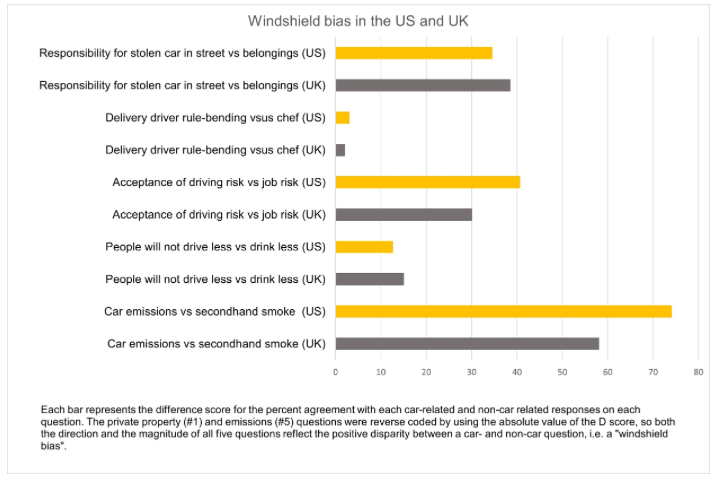Car Dependency is a Public Health Threat — But Americans are Too ‘Car Brained’ To See It
U.S. residents are more likely to shrug off the preventable public health impacts of car domination than they are to excuse the dangers of poorly regulated workplaces, lax secondhand smoking policies, and the negative consequences of drinking, a new study finds — and that “windshield bias” isn’t a uniquely American problem, either.
In a new paper, Texas A&M researcher Tara Goddard recreated a famous 2023 U.K. study that sought to quantify just how much Britons are affected by “motonormativity,” a term coined by researcher Ian Walker to describe how our collective cultural biases towards car travel shape the way we see the world. Then, Goddard compared her U.S. respondents’ answers with their counterparts across the pond, in hopes of better understanding the hidden psychology that underlies America’s heavily autocentric approach.
While the U.K. is more car-dominated than some European nations, the U.S. still reported nearly six times as many per-capita road deaths as the U.K. did in 2021, according to the World Health Organization.
“We really need to understand these biases that underlie not just our cultural beliefs around transportation, but how those things get into our planning decisions and our investment decisions. … But, of course, these things differ across different countries,” she added. “So I thought, yes — let’s replicate [this study] with a U.S. sample.”
Of course, just because fewer people die in U.K. car crashes doesn’t mean that Great Britain has shed the mantle of “motonormativty” completely.
For instance, both U.S. and U.K. residents were disturbingly likely to think of dangerous roads as an unfortunate reality they had to accept, rather than a policy failure that must be corrected — though Americans were significantly more ready to think of serious traffic injuries and deaths as inherently unavoidable.
Seventy-five percent of Goddard’s respondents either “somewhat” or “strongly” agreed with the statement, “Risk is a natural part of driving, and anyone who drives has to accept they could be seriously injured,” compared with 61 percent of respondents in Great Britain.
But when the researchers switched out the word “drive” for “work” — i.e. “Risk is a natural part of working, and anyone who works has to accept they could be seriously injured,” — only 34 percent of American respondents and 31 percent of U.K. respondents accept the premise, a shift Goddard attributed to both countries’ efforts to denormalize dangerous workplaces and implement legal and physical protections for people on the job. (Unless, of course, the roadway is their workplace.)

When it came to “smoking,” both Great Britain (75 percent) and the United States (94 percent) overwhelmingly believed that smokers had a responsibility to keep their toxic fumes away from places packed with other people — but if the only about one-fifth of either country’s residents agreed that drivers had a responsibility to keep their tailpipes away from “highly populated areas” where people might breathe their pollutants. Both car exhaust and cigarette smoke can cause cancer, heart disease, and a raft of other health problems.
“That really speaks to this huge, decades-long anti-smoking effort that we’ve had in the US, that in many ways, has been successful,” added Goddard. “And it also speaks to the fact that [smoking] is viewed very much as a choice [and driving is not]. Because of the way our environment is built and our society is laid out in the US, people don’t see driving as a choice — or even as something that could be a choice, if we had other, real options.”
The study even offered a few glimmers of potential hope.
Despite the fact that driving for most trips is essentially mandatory in many U.S. communities, most (55 percent) of U.S. respondents either strongly or somewhat disagreed with the statement, “There is no point in expecting people to drive less, so society just needs to accept any consequences it causes,” compared with just 31 percent of U.K. respondents.
That’s not as strong a response as when the researchers subbed out the word “drink alcohol” for “drive”; 70 percent of Americans thought their neighbors shouldn’t just “accept” the societal downsides of rampant alcohol use, compared to 52 percent of Brits, whose country has topped international lists for getting drunk at least weekly as well as childhood alcohol consumption.
Still, Goddard cautions that Americans’ attitudes towards their neighbors’ behaviors might not always be what we assume, whether those neighbors are behind the wheel or at the bottom of a bottle. And until we confront the cultural and psychological forces behind our windshield biases, it will be challenging to shift policy to make cities better for people outside cars — especially when those biases are buried in the brains of decision-makers, engineers, and voters.
“Culture is all around us, and there’s so many factors that build culture,” Goddard added. “So often, we’re not even aware that we’re seeing the world through that windshield — both literally and figuratively. But it very much limits our ability to envision something different.
“[When we’re suffering from ‘car brain,’ we might say things like], ‘Well, of course, congestion must be solved by just building wider roads, right?'” she continued. “Or, ‘Of course, everyone uses a car!’, forgetting about all the people in our communities who can’t or don’t drive.’ … [We need to] start digging out: What are these biases that limit our thinking? And then: what are the interventions?”
source https://usa.streetsblog.org/2024/09/09/driving-is-a-public-health-threat-but-americans-are-too-car-brained-to-see-it

Comments
Post a Comment